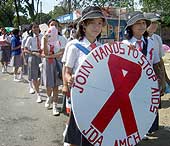 |
| How much do they know? Just talking about AIDS or sex does not give a teenager the complete picture |
Sunita Raman thought she had done a good job when she sat with her 14-year-old daughter one evening and lectured her about the birds and the bees and the menace of AIDS. “I told her that young girls should stay away from sex because AIDS had become a big threat. I thought I had got my message across,” recalls Raman.
One year later, however, the Ramans were horrified to learn that their daughter was pregnant. And since she refused to discuss any of her relationships with her parents, the gynaecologist advised that she should be tested for HIV.
With all mother-daughter communication closed, Raman took her daughter for counselling to a Bangalore-based counsellor and sexologist. She was told that her grown-up talk to her daughter had been grossly off the mark. “Parents do not realise that clinically given sex education reduces it to a lesson in reproductive biology. It disconnects sex from sexuality,” says Dr Padmini Prasad, director, Institute of Sexual Medicine, Bangalore, who also conducts sex education workshops in schools and colleges.
While school students know about AIDS and how it spreads, they fail to connect it to their own situation, says Prasad. “Students are incapable of using such information as they have no knowledge about sexuality,” says Prasad. Sexuality, according to Prasad, includes a gamut of emotional and physical issues, ranging from relationships, commitment, communication and sexual attitude to an individual’s maleness or femaleness.
Last year Prasad conducted a survey on sex and sexuality awareness among 1,500 students. For this she interviewed students from four colleges and one high school in Bangalore. The analysis of the responses threw up interesting facts, says Prasad. “Students knew all about AIDS, how it can be avoided, and about safe sex,” says Prasad.
The last point on Prasad’s list was to let students ask five questions on sexuality. “Most students were uncomfortable and didn’t have anything to say. Those who did, voiced their confusion about puberty, body growth, sexual desires and masturbation. These issues were not discussed either at home or school,” says Prasad.
Nowadays, while counselling parents, Prasad insists they keep communication channels wide open with their children. “As a culture, Indians are conditioned not to discuss bedroom activities with their children. This has to change,” says Prasad. That’s because today’s teenagers are growing up in an age of information explosion. “While the parent-child relationship still remains orthodox, children are exposed to pornography in print, on the Internet and in late-night movies. They get a distorted view of sexuality,” says Prasad. And improper sexual experimentation often leads to pregnancy, unsafe abortions and HIV and AIDS.
The Institute of Sexual Medicine has been running a sexual helpline for the last 10 years. While the helpline mainly received calls concerning post-marital sexual problems in the first few years, today the majority of callers are young and single. “We get 50 per cent calls from school and college students,” says Prasad.
Afew months ago, a 15-year-boy called the helpline saying he was suffering from chronic depression. His grades had gone down in school, as he couldn’t concentrate on his studies. “After a lot of probing, the boy revealed that he feared his organ size was smaller than his friends’. It gave him a massive inferiority complex and he had no one to talk to,” says Prasad.
“There is so much focus on looks today that even an improper beard growth can lead to anxiety. Parents cannot brush sexual education under the carpet anymore,” says Prasad.
Dr Sangeeta Saksena, director of a Bangalore-based NGO, Enfold, which works in the area of child sexual abuse, found that most parents have no communication channels with their children. While holding a workshop with parents at a Bangalore school, Saksena was approached by a mother who said she just could not get her teenage daughter to open up to her. “She complained that every time she asked her daughter if something was bothering her, she would simply go into a shell,” says Saksena.
The reason, according to Saksena, is that parents block communication routes at an early stage. Last year, Enfold conducted a survey among Class III students, asking them to make a list of things their parents spoke to them about. “A majority of the students made a list of dos and don’ts,” says Saksena. The list was a series of, ‘brush your teeth’, ‘do your homework’ and ‘don’t watch TV’, she says.
“Parent-child communication has become purpose driven. Parents do not talk at an emotional level and do not address the feelings of the child,” says Saksena. Till a generation ago, parents could get away with narrow communication channels with children, says Saksena. “But now, with the media and the Internet boom, there are drastic changes in the environment. Parenting methods also have to change,” she says.
Dr Ali Khwaja, head of Bangalore-based counselling cell, Banjara Academy, says sex education can only be a part of an ongoing parent-child communication process. It cannot be discussed in isolation. “One day can’t be designated as a Sex Education Day. Parents should discuss sexual issues as and when they come up in the daily course of life — like while watching a pre-marital love drama on television or if a baby is born in the family,” concludes Khwaja.










